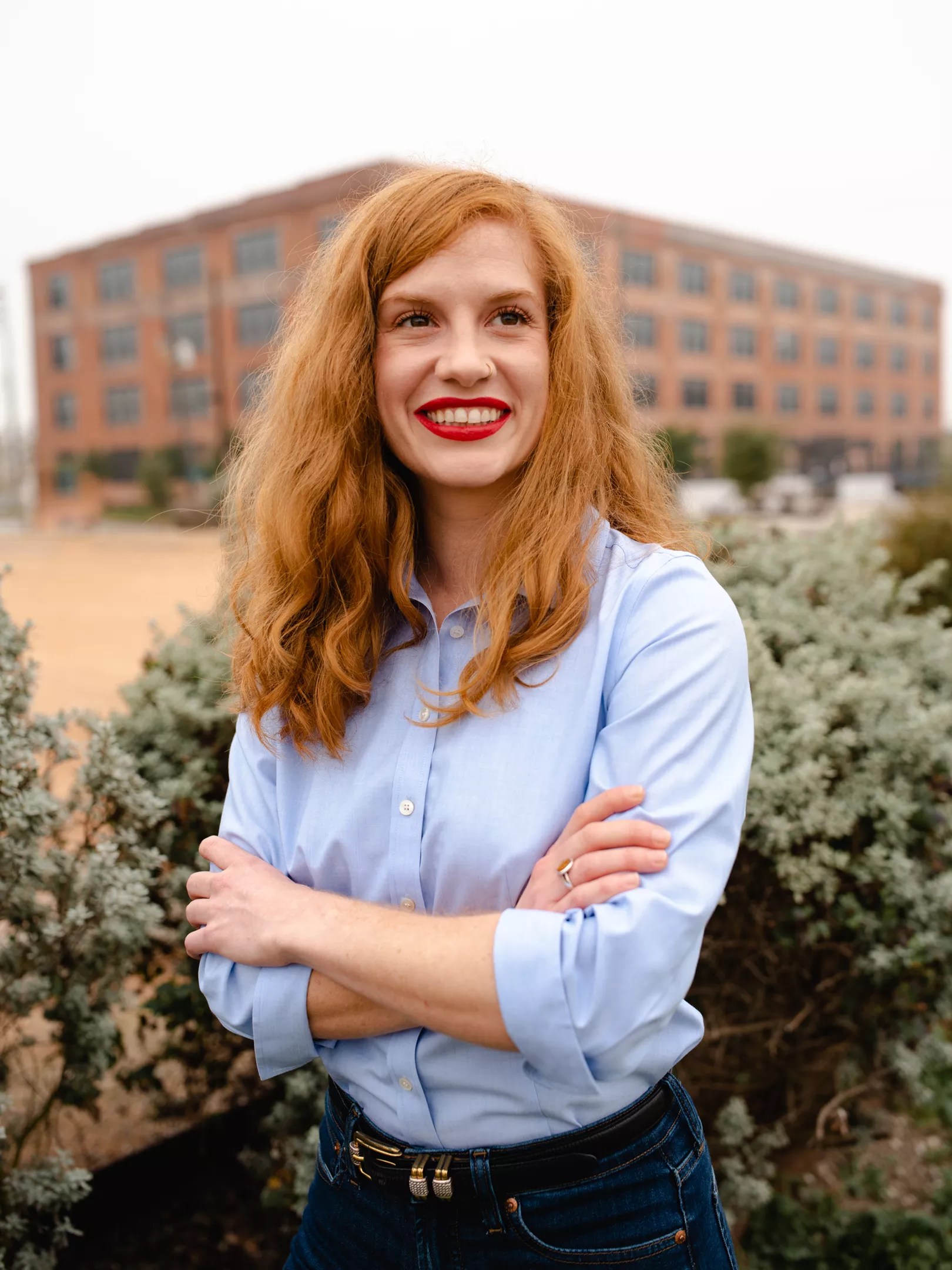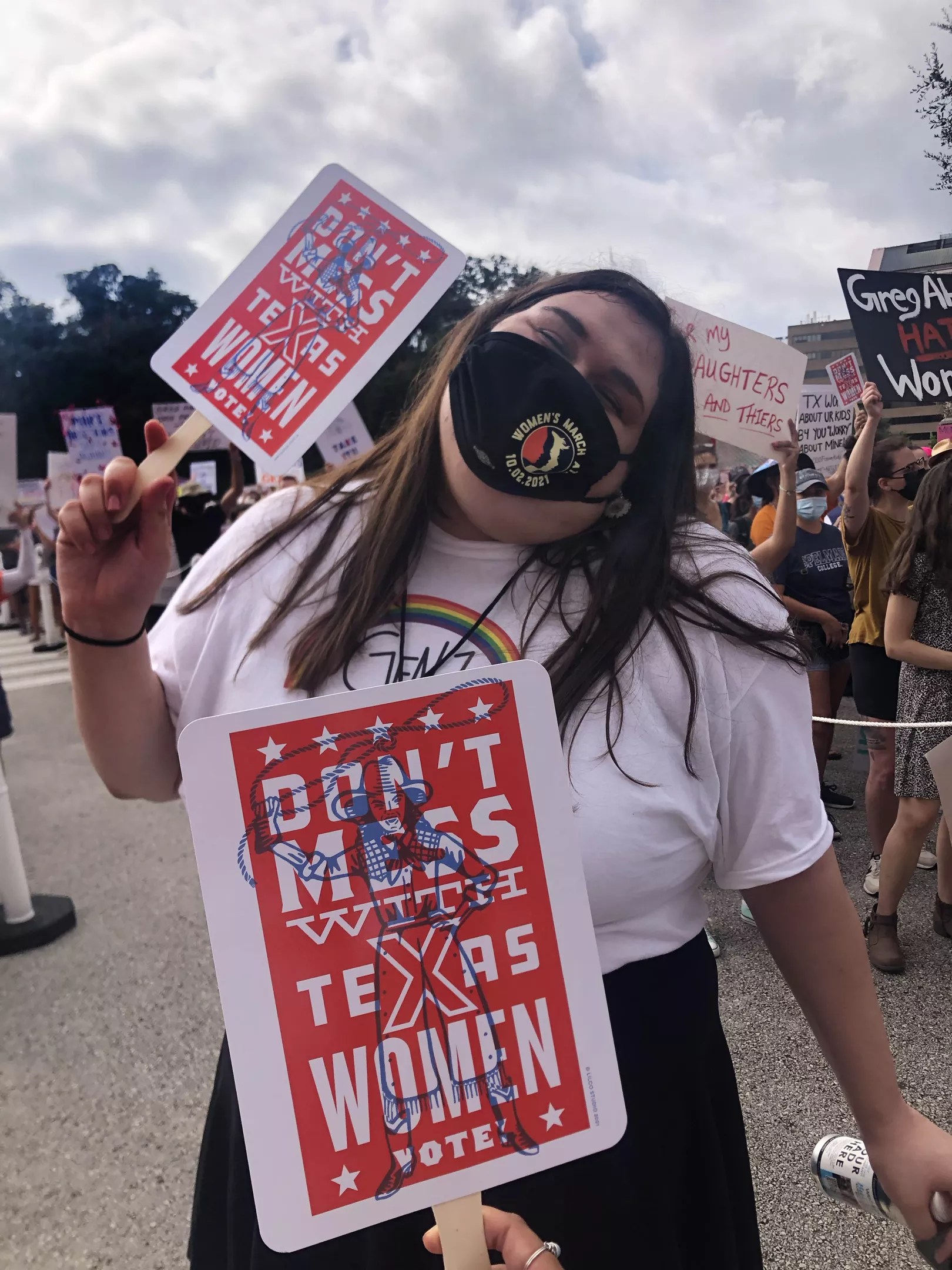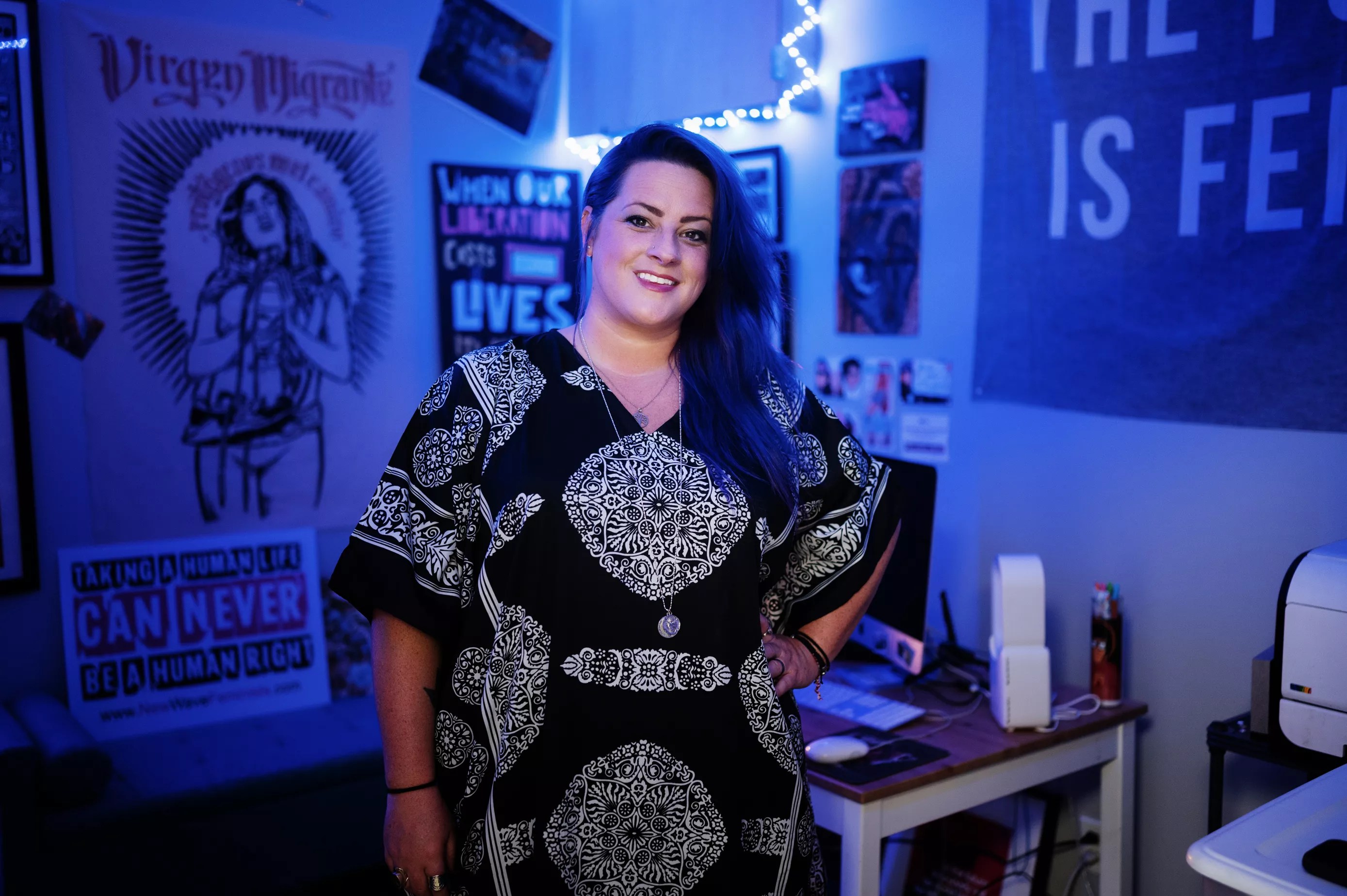
Illustration by Pablo Iglesias

Audio By Carbonatix
Molly Cook was devastated when they made her listen to the heartbeat.
Several years ago, when she was 24, the Houston nurse was rebounding from a tough breakup and began seeing someone who wasn’t a good long-term fit. He told her that he didn’t want to use a condom. She acquiesced.
Cook said she took Plan B, the emergency contraceptive, but it didn’t work. She was pregnant and heartbroken. It wasn’t how things were supposed to happen.
“Everything about it was wrong,” she said.
The man who impregnated Cook didn’t love her, and she was just getting started in her career, working nights, she said. Her mind ran at a million miles per hour: Should she put the child up for adoption? Could she try to make it work with the father and get married?
Eventually, she made the difficult decision to seek an abortion, one she didn’t even tell her family about at the time.

Molly Cook is a nurse who made her personal abortion story public while running for state Senate.
courtesy Molly Cook
If the pregnancy had happened today, Cook would have been forced to give birth, cross state lines or endure a potentially dangerous underground procedure.
Last year, the conservative-majority Texas Legislature virtually banned abortion with one of the strictest pieces of anti-abortion legislation in the United States, Senate Bill 8. One by one, Republican-led states have followed suit, and now, the U.S. Supreme Court appears poised to overturn Roe v. Wade, the 1973 decision that enshrined abortion as a constitutional right.
SB 8 enables private citizens to sue providers or others who “aid and abet” an illegal abortion. If the plaintiff is successful in court, they stand to receive a bounty of $10,000 plus attorneys’ fees.
Anti-abortion activists have praised SB 8, which took effect Sept. 1, as an airtight piece of legislation that will save the lives of countless unborn. But women’s rights advocates fear that it sets a dangerous legal precedent and endangers the health and safety of Texans seeking critical reproductive care.
Days before the filing deadline last year, Cook got motivated and decided to run for state Senate. She focused on hot-button issues from the previous legislative session such as Texas’ faulty power grid and transgender rights, plus things like housing and health care.
Then, to mark the 49th anniversary of Roe v. Wade in January, Cook released a campaign video baring it all.
“My name is Molly Cook. In 2014, I had an abortion,” she says in the short clip. “Abortion is a medical procedure and a personal choice. Our Legislature’s role is to make sure abortions are safe, accessible and stigma-free for every Texan.”
Although she ultimately lost her primary bid for the Democratic nomination, Cook is committed to forging ahead. Things are “really, really bad in Texas right now,” she told the Observer, and they’re likely to get worse.
To Cook, the push to outlaw abortion is a power grab away from people with uteri. It’s a way to keep the marginalized down. In present-day Texas, the state’s rightwing is further stigmatizing a procedure that’s existed for millennia, dating as far back as ancient Egypt.
Cook can’t imagine how different her life would be today if she’d been forced to give birth: “I feel gratitude every single day.”
***
In a dark gray blazer and striped red tie, Gov. Greg Abbott was beginning to get frustrated with the press. A flank of men in formal wear stood behind him. It was days after SB 8 took effect, which bans abortions after around six weeks, before many know they’re pregnant. The law doesn’t provide exceptions for rape or incest.
So, when asked about forcing victims of sexual assault to carry their pregnancy to term, the Republican governor pushed back with an absurd promise. Texas would work to “eliminate all rapists,” he vowed.
Abbott also wrongly said sexual abuse survivors have “at least six weeks” to seek the procedure. In reality, the six-week countdown begins on the first day of the last menstrual cycle, said Dr. Sarah Horvath with the American College of Obstetricians and Gynecologists. That leaves most women just one or two weeks after they miss their period to terminate the pregnancy.
In the first month after SB 8 went into effect, the number of performed procedures plummeted by nearly 60%, according to Texas Health and Human Services. Yet the new law hasn’t stopped women from seeking abortions out of state.
Planned Parenthood announced earlier this year that from September to December 2021, its health centers in surrounding states witnessed a nearly 800% increase in Texas abortion patients.
The number of people ordering abortion-inducing medication has also skyrocketed in Texas following SB 8. Last year, during the first week of September, one nonprofit that provides those meds saw daily requests rise by 1,180%, according to a study published in JAMA Network Open. The rest of the month stayed 245% higher than the pre-ban average.
“That big of a spike in requests shows us the uncertainty and chaos created by Senate Bill 8 going into effect,” the study’s lead author told The Texas Tribune. “If it’s not certain that you can go to a clinic and get the care that you need, people will be looking around for what other options they have.”
But John Seago, legislative director for the anti-abortion organization Texas Right to Life, thinks that those numbers could be skewed by women who ordered the medication but won’t necessarily use it. Since SB 8 passed, some pro-choice advocates have encouraged people to have it on hand in case of future need.
Texas Right to Life championed SB 8 and sees “elective abortion” as an act of injustice. “It’s a stronger, bigger party taking the life – through violence – of a smaller, weaker party,” Seago said.

John Seago is pro-life but thinks that women need more social and medical services in Texas to make it feasible.
courtesy John Seago
Texas is offering a preview of a post-Roe state, he continued. But while there’s been “significant progress” toward the anti-abortion movement’s goal, SB 8 has also revealed challenges that the state needs to address. Texas leadership must ramp up social and medical services so that women don’t feel the need to seek abortion beyond state lines, he said.
But Seago, who has a doctorate in bioethics, notes that not all pro-lifers are happy with the latest law. Some hard-right conservatives feel that it doesn’t go far enough.
During a livestreamed luncheon earlier this year, a Republican state House candidate defended his support for a bill that would have allowed law enforcement to charge women who receive an abortion with assault or homicide. The latter charge can be punishable by death.
“Do we all agree that abortion is murder? Absolutely,” the candidate said. “There should be consequences for it.”
Texas Right to Life doesn’t want women who seek the procedure to be prosecuted, but Seago knows there’s been public confusion surrounding the law.
In April, a South Texas woman was charged with murder over a self-induced abortion. Although the charge was later dropped, she spent three days behind bars on a $500,000 bond, according to The Texas Tribune.
It’s important to understand abortion’s legal definition, Seago said. It doesn’t include treating ectopic pregnancy or any miscarriage-related procedure, nor does it mean contraception. SB 8 also doesn’t apply during medical emergencies when a pregnant woman’s life is in jeopardy.
Still, Seago acknowledges that for some Texans, the lines surrounding SB 8 seem fuzzy. Misconceptions abound and the media haven’t always helped in clearing them up, he said.
“Unfortunately, that misinformation is still out there, and it’s still being talked about, and not everyone gets this right,” he added. “And I think there’s some opportunities for our medical associations to clarify that. They decided just to step back and not touch this issue.”
But the abortion law has sown tension between some women and their doctors. Certain pro-choice activists say SB 8 has also worked to criminalize miscarriages.
On May 9, Texas-based community advocate Janneke Parrish took to Twitter to explain that she recently miscarried without even knowing she was pregnant. After experiencing lower back and pelvic pain, she sought medical attention.
A doctor asked Parrish about her medical history, and she told them she’d had an abortion in the past. The tone “shifted dramatically,” she claimed, and the doctor began barraging her with questions, including whether she’d purposefully harmed herself.
“Intentionally or not,” Parrish wrote, “it felt like I’d become a suspect in the death of something I didn’t know existed.”
***
Around 3 a.m. on Saturday, May 7, a woman wearing a beanie and a face mask appeared before Loreto House, an anti-abortion pregnancy resource center in Denton. Holding a can of spray paint, she approached the Catholic nonprofit.
The woman looked to her right and left, then back to the right. Using white paint on the black front door, she scrawled in all caps: “NOT A CLINIC.” Beside it, on wall made of grayish stone and brick, she wrote in large purple letters: “FORCED BIRTH IS MURDER.”
Denton police released video of the suspect days later and asked for the public’s help in identifying her. The incident came just days after Politico reported that the Supreme Court will overturn Roe v. Wade, based on a leaked draft opinion.
A final decision may not come until this summer, in late June or early July, and the justices could potentially change their minds. But the leak has sparked outrage among pro-choice activists and ignited passions in cities across the U.S.
Earlier this month, protesters marched to the Virginia home of Justice Samuel Alito, who authored the draft opinion. They’ve also demonstrated outside the residences of Justice Brett Kavanaugh and Chief Justice John Roberts.
Yet several Texas district attorneys, including Dallas County’s John Creuzot, have claimed they won’t seek criminal charges if the landmark ruling is reversed.
The Supreme Court’s draft decision has already weighed heavily on those working in North Texas’ Whole Woman’s Health clinics. One employee in their Fort Worth and McKinney locations, who spoke pseudonymously for fear of harassment, said it’s all been “a lot” to process.
Right before SB 8 took effect, the woman, whom we’ll call Natalie, said it felt like a race against the clock to see as many patients as they could. On Aug. 31, 2021, at the Fort Worth location, they worked until just before midnight. Patients waited for hours on end and staff was willing to stay for as long as it took.
The following day, an eerie calm set in. But it soon became apparent just how much misinformation their patients had absorbed, Natalie said. The first couple of weeks post-SB 8 were spent clarifying the law and letting people know that they could still seek care.
Some women who were too far along in their pregnancy to terminate at the clinic have even asked staff for advice on unscientific DIY options, she said. (Instead, Whole Woman’s Health offers to help with setting up appointments in other states and finding travel accommodations.)
“It’s always worrisome when somebody asks those questions: ‘What if I take enough Vitamin C?’ ‘What if I take this random concoction that I read on the internet?'” Natalie said. “We can tell them that we don’t recommend it, that it doesn’t seem like a good idea. But you never know what people are going to do when they go home.”
Whole Woman’s Health is just as booked as it was before, but only around half as many patients are able to return to receive service. Some people come too early, a day after they missed a period, and aren’t actually pregnant. Of course, many come too late.
Natalie has also seen SB 8 backfire. Now, some who have doubt about receiving an abortion may rush to get one so they don’t miss that narrow six-week window. Others may choose to remain pregnant, but later change their mind before realizing they’ve run out of time.
“It really does force the patient’s hand,” Natalie said.
SB 8 has had other consequences that lawmakers may not have anticipated. In February, an Austin woman elected to have her fallopian tubes removed in response to Texas’ abortion law, explaining she refused to be used as “an incubator by the state.”
Natalie notes that there’s not a typical patient, but that the majority are already mothers who aren’t in a place to have another child. Plenty of people do want kids someday but say that now just isn’t the right time.
So, many must travel long distances for appointments, sometimes driving with their partner and kids in tow, she said. Yet surrounding states are passing their own abortion bans, and some clinics have become overwhelmed by the influx of out-of-state patients. The more copycat laws on the books, the farther abortion-seekers will have to go.
Earlier this month, Oklahoma’s governor signed into law a similar abortion ban, which took effect immediately. But Natalie notes that at one point, the McKinney location would actually see Oklahomans in need of care – those who hadn’t passed the six-week limit – because their home state’s clinics were too booked with Texas patients.
If Roe is overturned, Texas’ so-called “trigger law” would go into effect shortly thereafter, making the act of performing the procedure a felony. Until then, Natalie said, Whole Woman’s Health will continue to see patients. After that, they’ll help in any way they can, including by providing ultrasounds so that Texans can know what to do next.
“The need isn’t going to go away at all,” she said. “It’s just the amount of people who are going to have to travel out of state, or patients who are going to try and figure it out on their own.”
***

Olivia Julianna became frustrated with the way health providers focused on her possible infertility and ultimately embraced that as a positive in her pro-choice advocacy.
courtesy Olivia Julianna
Seven or so years ago, when Olivia Julianna was 12, she was diagnosed with polycystic ovary syndrome, a hormonal disorder that causes small cysts to appear on the edges of enlarged ovaries. While she was in the hospital, Julianna’s doctor told her it’d be hard for her to ever have kids. The way that conversation went left her feeling like her body was just a means to an end.
“Every time someone talked to me about it, it was almost like they felt like my reason for living was over. If I can’t be a mother, then what value can I provide?” Julianna said. “So I’ve always been very pro-choice because I feel like women, and people in general, are so often just seen as vessels.”
On top of having a hormonal disorder, the 19-year-old is diabetic, so her health could be jeopardized if she were to ever get pregnant. Reproductive health care has always been important to Julianna, and she wants people to understand that her life isn’t over just because she can’t physically have kids.
That experience helped lay the groundwork for Julianna to become a pro-choice activist, and she’s now the political strategy coordinator for an organization called Gen-Z for Change. Last year, Julianna launched a viral TikTok challenge that took aim at one of the state’s most powerful anti-abortion organizations.
Texas Right to Life had created a whistleblower website so that private citizens could report people they suspected had broken the state’s new abortion ban. Days before the law was set to take effect, Julianna addressed her social media followers with a call to action.
“It would be really, really bad and morally wrong of all of you to go to prolifewhistleblower.com and send in an anonymous tip that is fake,” she said, her tone dripping in sarcasm.
The internet answered her call.
Soon, Texas Right to Life’s whistleblower website was flooded with fake tips, including some that seemed like they could be credible. But other pranksters got a bit more creative, submitting text like “Greg Abbot’s [sic] butt stinks” and links to Shrek porn.
“It’s almost beautiful because it’s a very Gen Z thing to do,” Julianna said.
Shortly after, she added, the whistleblower website had crashed. (Seago disputes this claim, saying the site was successful until it was booted by their web host.)
Since SB 8 passed, other states across the country have attempted to enact similar legislation, Julianna noted. In March, South Dakota moved to further limit residents’ ability to access abortion via medication. If Roe v. Wade is overturned, proposed legislation in Ohio would criminalize the procedure, including in instances of rape and incest.
“Texas took the first step to push that legislation through and show them that it is possible and that the Supreme Court’s not going to overturn it,” Julianna said. “Texas is always willing to take the first shot.”
***

Destiny Herndon-De La Rosa had a child when she was a teenager and supports pro-life initiatives.
Mike Brooks
Destiny Herndon-De La Rosa got pregnant at 16 and was conceived when her own mom was 19. She credits her ability to raise a kid at such a young age to the fact that she had a supportive family and a roof over her head.
Abortion “wasn’t an option” for her, but Herndon-De La Rosa says she was terrified all the same. She understands what would push someone to seek the procedure, the despair that would drive that decision.
Even though she identifies as a pro-life feminist, Herndon-De La Rosa doesn’t believe that abortion bans are necessarily the answer. The Texas Legislature may have cut off the supply, but they haven’t done nearly enough to address the demand for basic resources.
Herndon-De La Rosa is the founder of an organization called New Wave Feminists, which touts the goal of making abortion needless and unthinkable. She’s critical of the state’s supposed “pro-life” leadership and is quick to point out lawmakers’ shortcomings.
Certain anti-abortion organizations have claimed that scores of unborn lives have been saved since SB 8 took effect. Texas Right to Life, for instance, estimated in January that at least 10,000 fetuses had already been rescued. Later that same month, another group put that number at more than 22,000.
But Herndon-De La Rosa isn’t so sure. She said those assertions can’t be proven until more data is gathered about the increase in births. Plus, many of those would-be moms may have aborted via medication or by crossing borders.
It doesn’t help to just limit the procedure without doing anything to alleviate women’s desperation, she argued. “I think we’ve saved a lot of politicians,” Herndon-De La Rosa said. “Do I think we saved a lot of babies? No. I think that a lot of this was political theater.”
Earlier this month, The Texas Tribune reported that more than 25% of Texas women of childbearing age are uninsured, which is the highest rate nationwide. The state’s social safety net is nowhere near ready for the potential spike in births, with experts warning that the abortion ban will create more generational poverty and disproportionately target Texans of color.
The Lone Star State also has one of the highest maternal mortality rates in the country, regularly landing in the bottom 10. The nation’s rate is the highest in the industrialized world.
SB 8 technically provides an exemption for maternal life threats, but Horvath, the OBGYN, notes that it’s overly simplistic. Medicine isn’t black and white. Doctors often have to consider a range of potential outcomes and think in terms of probabilities.
“You have to ask yourself, ‘Well, what constitutes that threat?'” she said. “Is a 1% risk of dying enough? Does it have to be 5%? Does it have to be 50%?”
Texas doesn’t offer exceptions for fetal anomalies, meaning that some women will be forced to give birth to babies who won’t survive outside the womb, Horvath said. It’s not hard to imagine the emotional and psychological toll that would take.
Laws like SB 8 will also usher in a deep loss of skills, she said. If medical professionals who provide that care are moving elsewhere to practice, it will lead to a lack of legacy training for the next generation of residents.
In one recent case, Horvath had a second-trimester patient who was hemorrhaging blood and wound up receiving an abortion. But she fears that laws like SB 8 will force physicians to consider the legality of such care.
“It was absolutely lifesaving and the right thing to do for this patient,” she said, “but you can see where some folks would certainly pause.”
Herndon-De La Rosa believes that if Roe v. Wade is overturned, the question of abortion’s legality will return to the states. She worries it’ll also mean that resources for women in crisis pregnancies will skip places like Texas for those that are restriction-free, such as Colorado.
In nature, female animals sometimes kill their young because of external stress, Herndon-De La Rosa said. She believes that most women have the instinct to protect their progeny, but when they’re facing significant hardship, abortion may seem like a merciful choice.
Many who make the decision to abort do so because of deep-rooted financial constraints, she said. The state could help by providing affordable child care and housing. Transportation is also a major factor: It’s difficult for women to take public transit to doctor appointments if they can’t afford to take time off work, or if they have other kids.
To aid people in crisis pregnancies, look to your own areas of excess, Herndon-De La Rosa added. If you have spare funds, donate to charities. If you have a spare room, offer it.
“Stuff like that is ultimately what is going to make abortion unnecessary and unthinkable,” she said, “not these restrictive laws.”